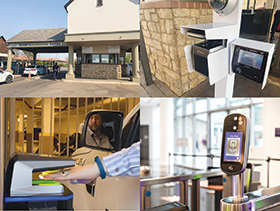

One very important criterion for people moving into a residential estate is the level of security they will find to fulfil their desire to live in a truly secure environment. This can be achieved through the use of multiple technologies including CCTV, perimeter protection and others, but of course it is also absolutely crucial to protect access to the estate.
Residents could be using simple RFID card keys similar to the one they use in the office, but the main drawback of this technology is that it is an imperfect authentication factor: cards can easily be counterfeited if based on old, compromised technologies (kits can be found online for less than R1500 to copy a card in less than 2 minutes); but even with the latest secure technologies, a card can still be stolen easily and used by an intruder.
The only fully powerful authentication factor is biometrics, because contrary to a card which is something I have, it’s who I am: my personal, unique, unforgeable human characteristics. Implementing biometric terminals at gates (either pedestrian or vehicle) is therefore the only option to guarantee that the person entering is a genuine, authorised resident or service person. Modern biometric technologies like the ones proposed by IDEMIA, whether based on facial recognition or fingerprint scanning, provide the best security/convenience compromise.
Security means biometric accuracy (very low rate of ‘false acceptance’ and ‘false rejection’). It also means resistance to spoofing attempts (ie, presenting a printed photo of a real resident to fool the facial recognition terminal). Security is also at the terminal level itself, meaning its capacity to resist cybersecurity attacks to take control of its content or modify its behaviour remotely. This is why IDEMIA submits its terminals to external evaluation laboratories to assess and confirm the claimed performance levels.
Convenience means that those technologies must be easy to use, to facilitate user adoption. For this, IDEMIA pioneered the concept of contactless biometrics, in particular with MorphoWave, the only terminal able to scan and identify four fingerprints through a simple and quick hand-wave movement, without touching any part of the device. Thousands of residents at many different estates in South Africa already enjoy the technology every day. Others use our VisionPass facial recognition terminal, the only one certified by iBeta Lab against spoofing.

| Tel: | +27 11 601 5500 |
| Email: | [email protected] |
| www: | www.idemia.com |
| Articles: | More information and articles about IDEMIA |

© Technews Publishing (Pty) Ltd. | All Rights Reserved.